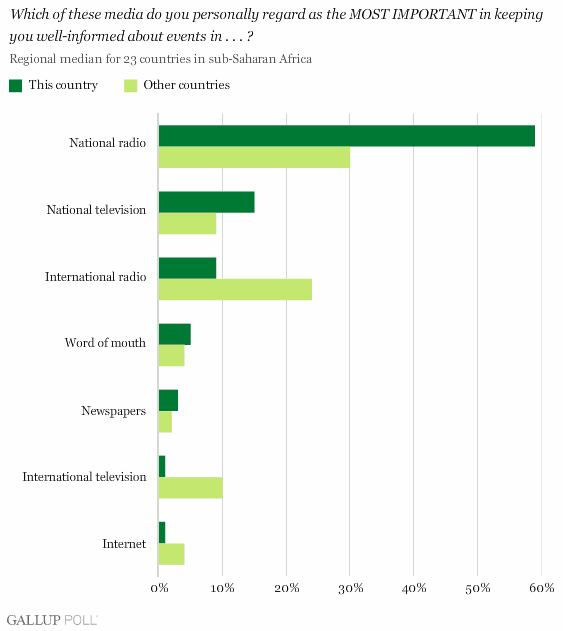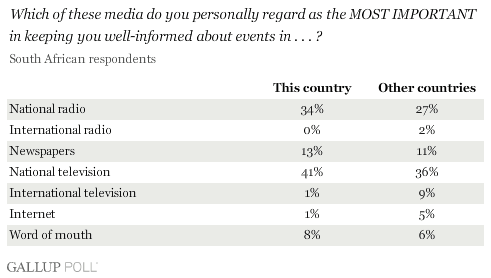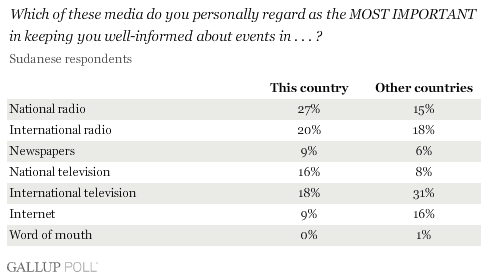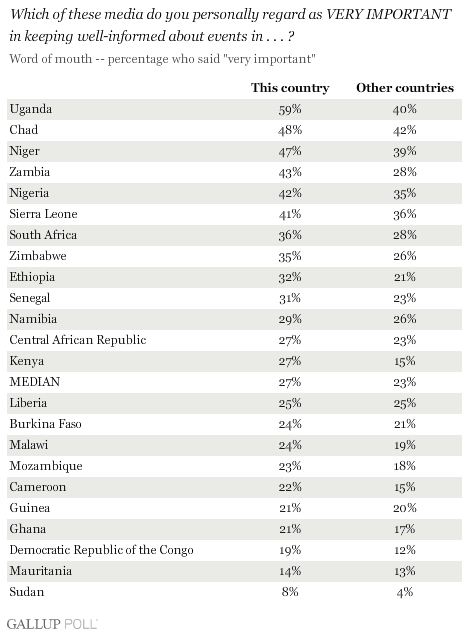WASHINGTON, D.C. -- Many people in sub-Saharan Africa tell Gallup that radio is the most important medium they rely on to keep them informed about news events.

Across 23 countries, a median of nearly 6 in 10 respondents (59%) say national radio is the most important medium they use to keep well-informed about events in their own country. When asked what the most important media is for receiving news about other countries, a median of 30% say national radio and a median of 24% say international radio.
Radio use in sub-Saharan Africa is high for a number of reasons. Low literacy levels and poor circulation make dependence on newspapers negligible, and the cost of purchasing a television is prohibitive to many in this region. Internet use, although rising in some countries because of an increase in the number of Internet cafes in many major cities, is still nominal.
Of the countries surveyed, only South Africans and Sudanese are more likely to say other forms of media are most important than they are to say radio is most important in keeping them informed about events in their own countries. In South Africa, a country with the highest per-capita GDP among the 23 countries surveyed, more citizens say they rely on national television for national and international news, although radio is a close second. In Sudan (excluding the Darfur region and parts of the South around Juba and Nimule), citizens place nearly equal importance on international television and radio for staying well-informed about international events.


Many sub-Saharan Africans say they rely on word of mouth to stay well-informed about national and international events. In four sub-Saharan African countries (Burkina Faso, Chad, Sudan, Zimbabwe) at least 10% of respondents say word of mouth is the most important medium in keeping well-informed about events in their country and other countries.
Among the sub-Saharan countries surveyed, with the exception of Sudan, double-digit percentages consider word of mouth to be a very important means of staying well-informed about events in their own country, ranging from 59% in Uganda to 14% in Mauritania. Ugandans are the most likely at 40% to say word of mouth is very important in keeping well-informed about events in other countries. In contrast, only 4% of respondents in Sudan say the same.

Survey Methods
Results are based on face-to-face interviews conducted throughout 2006, 2007, and 2008. Randomly selected sample sizes typically number 1,000 residents, aged 15 and older, in the 23 countries polled. In Angola and Congo (Kinshasa), surveys were conducted in primarily urban areas. Surveys in Sudan did not include Darfur and parts of the South (around Juba and Nimule). In Chad and the Central African Republic, the eastern parts of each country were not surveyed. In Uganda, the northern part of the country was not surveyed. For results based on samples of this size, one can say with 95% confidence that the maximum error attributable to sampling and other random effects is ±5 percentage points. In addition to sampling error, question wording and practical difficulties in conducting surveys can introduce error or bias into the findings of public opinion polls.
